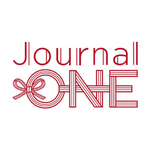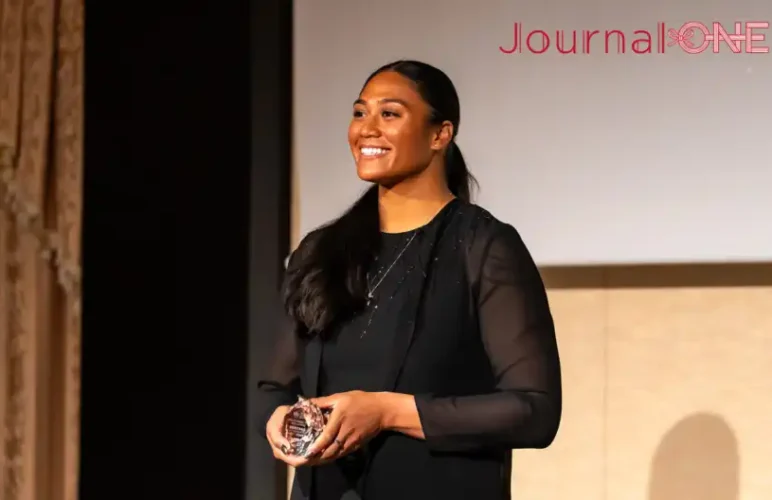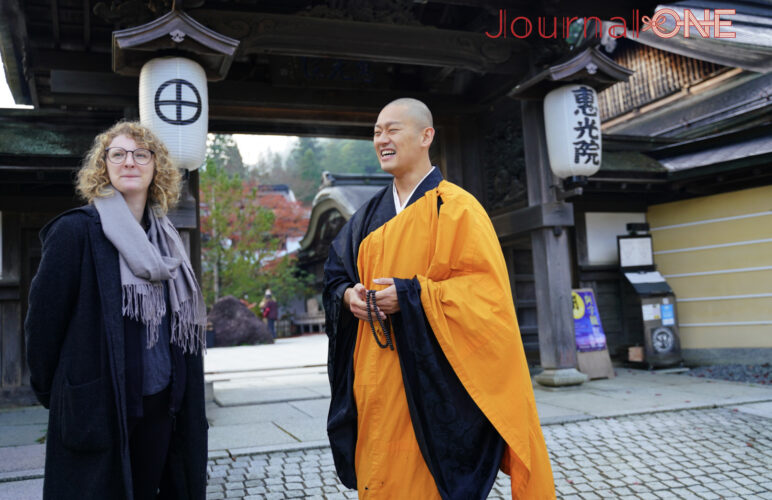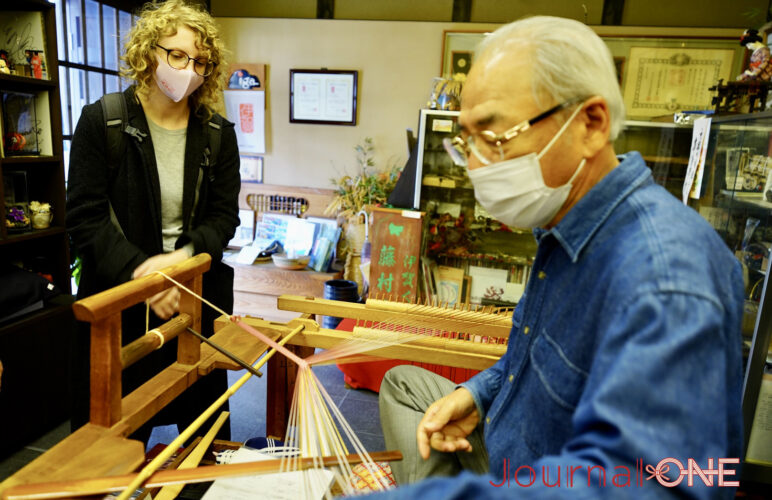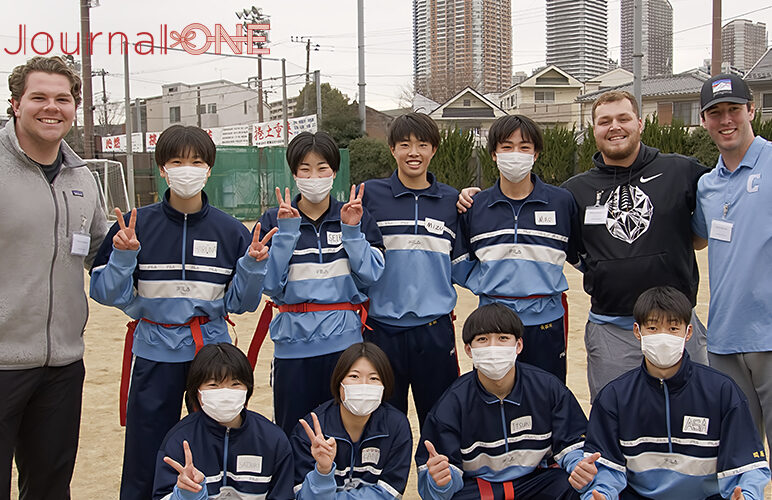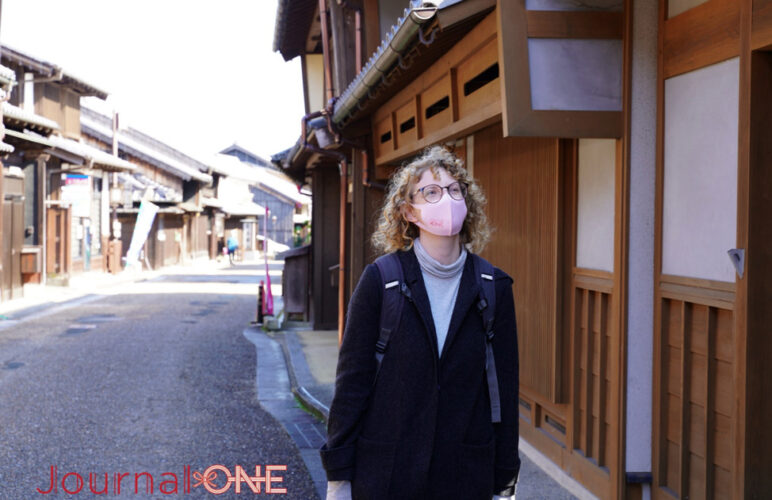![]() Everyone knows that United Nations (UN) is an international organization for the purpose of maintaining peace and social development. However, did you know that there is a “National Model United Nation” (NMUN)where university students from around the world discuss international issues?
Everyone knows that United Nations (UN) is an international organization for the purpose of maintaining peace and social development. However, did you know that there is a “National Model United Nation” (NMUN)where university students from around the world discuss international issues?
Model United Nations(MUN) itself has its origins at Syracuse University, where it was first held as an “intercollegiate Model United Nations” in 1927, when the United Nations did not exist. Nowadays, the activity has spread all over the world, and surprisingly, approximately 400 Model UN conferences are held. The sponsors range from high school and university club activities to non-profit organizations such as the United Nations Association of the United States of America. It is amazing how high level of their educational programs, which include not only the ability to use English, the official language of the meetings, but also understanding the structure of international politics and experiencing the process of thinking about solutions to international problems is.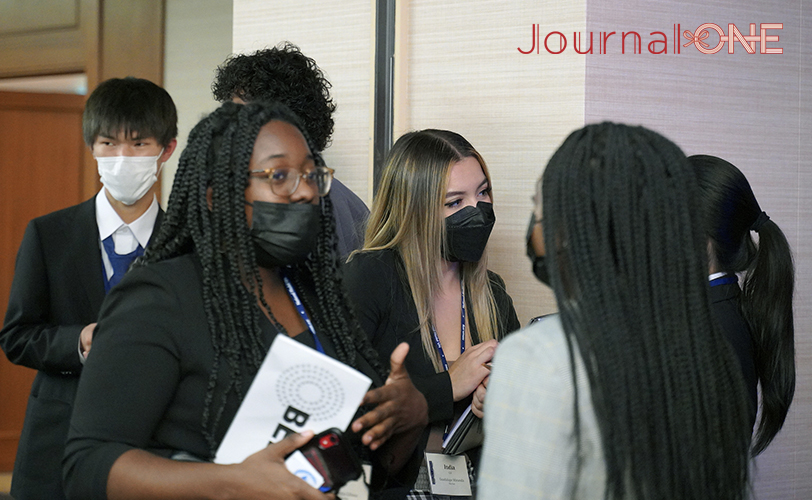 The Model United Nations World Conference was suspended due to the spread of COVID-19, but the event could finally be held in Japan after 2 years of waiting. We, Journal-ONE were able to interview a part of the “National Model United Nation 2022″(NMUN 2022) held at Kobe Portopia Hotel and other locations from November 20 to 26 with the cooperation of the host school, Kobe City University of Foreign Studies.
The Model United Nations World Conference was suspended due to the spread of COVID-19, but the event could finally be held in Japan after 2 years of waiting. We, Journal-ONE were able to interview a part of the “National Model United Nation 2022″(NMUN 2022) held at Kobe Portopia Hotel and other locations from November 20 to 26 with the cooperation of the host school, Kobe City University of Foreign Studies.
We would like to report on the wonderful smiles and great activities of 298 students of diverse nationalities from 42 universities and organizations in 11 countries (Japan, the US, UK, Germany, Philippines, Italy, Canada, Ukraine, Australia, Thailand, and Chile), including Kobe City University of Foreign Studies.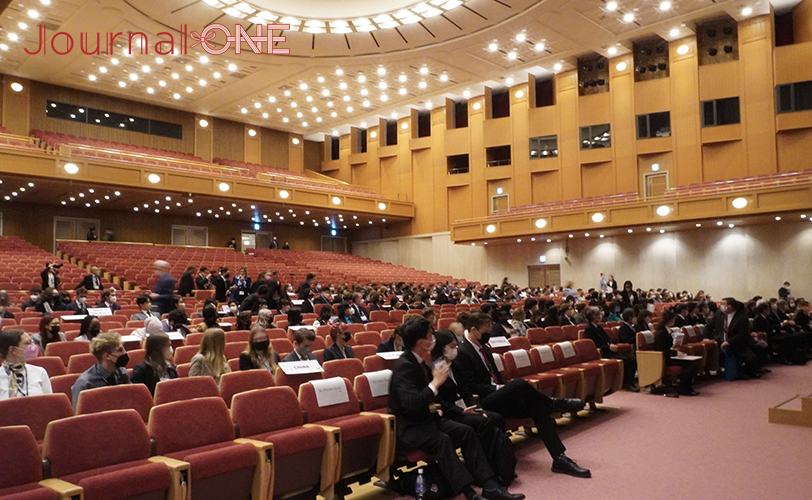
In this report, we would like to introduce the opening ceremony as well as the sessions where we were divided into four chambers for discussion. Also, click here for a report by Ms. Azuki Suzuki of Kobe City University of Foreign Studies on the cultural visiting held in Kyoto the day before.
<On the theme of “Peace,” >
NMUN is the largest of all the Model United Nations activities held around the world. In the spring, NMUN is held in New York with 5,000 participants, and in the fall, NMUN is held at universities around the world as host schools.
Kobe City University of Foreign Studies, the host school for this year’s NMUN, has experience in hosting Japan’s first NMUN in November 2016. This is the second time in six years. This year’s conference was postponed for two years due to the spread of COVID-19, so it can be said that this year’s conference is also a reflection of the students who graduated during those 2 years.
The main theme of this year’s conference was “Peace.
This theme was decided even before the situation in Ukraine broke out, but it has become the most important theme to think about at this time when the world situation is unstable. There are many issues that can potentially threaten peace even around Japan. How should we face them, including the corona disaster, food shortages due to the population explosion, energy problems and global warming, and other issues that threaten people’s daily peace in the world? It is truly encouraging to see young people from around the world, who hold the future in their hands, gather to discuss these issues.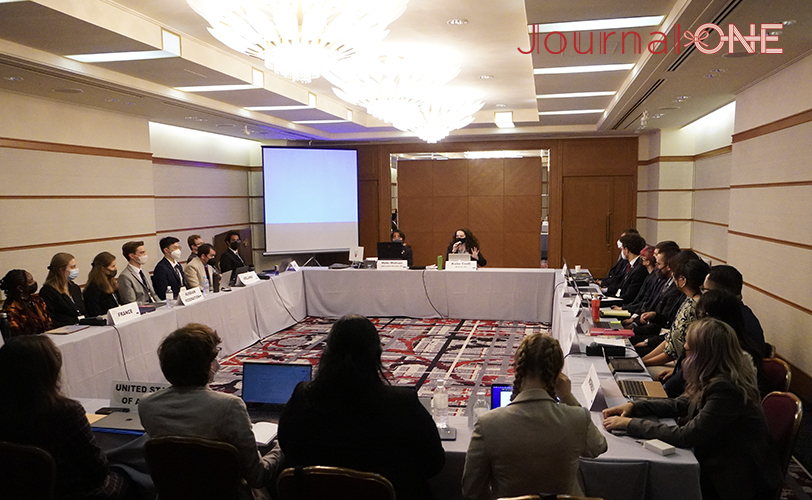
<Preparation for NMUN>
NMUN is a simulation activity in which each participant plays the role of a delegate of a country, just as in an actual UN conference. It is a high-level educational activity designed to deepen students’ understanding of international issues through discussions at the conference, as well as to improve their overall international communication skills, including negotiation, debate, and language skills.
Once the students are selected as delegates to represent their countries, they begin preparing for the conference months in advance!
First, they must gather information about the culture, history, and relations with other countries of the country they will be representing. This is a universal rule of Model UN, where delegates are representing a country other than the one they come from. Throughout the preparation, students acquire research skills and at the same time develop a mindset of trying to understand people with different backgrounds from their own.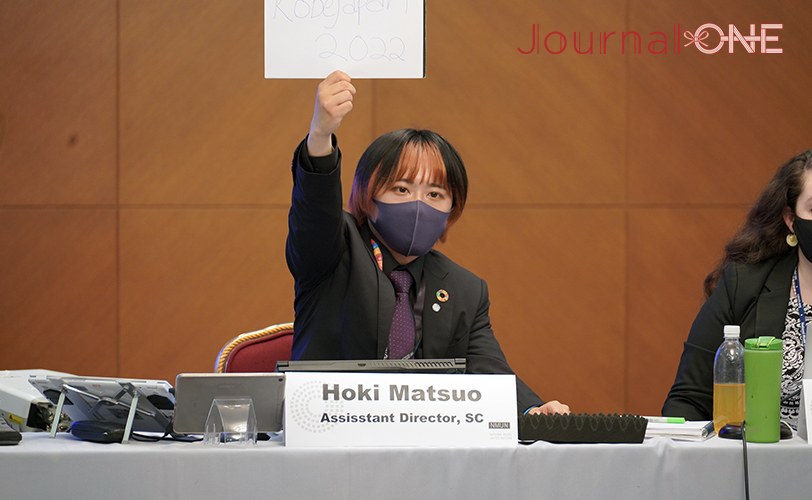
NMUN is almost the same as actual UN activities, where discussions and negotiations are held with other countries to reach an agreement in the form of a UN resolution. Therefore, it is necessary for students to understand not only the UN, but also the flow and rules of the resolution process.
During the conference, there is a formal session in which each country makes a speech to express its opinions and intentions on the agenda. It is extremely difficult to prepare a speech from scratch, while referring to advice from experienced senior members…
In addition, in informal sessions, where they negotiate and discuss freely with other countries, they must respect the opinions of other countries while firmly asserting their own country’s views. In order to acquire negotiation skills along with the ability to express oneself, students practice daily to prepare. This also allows them to develop high communication skills.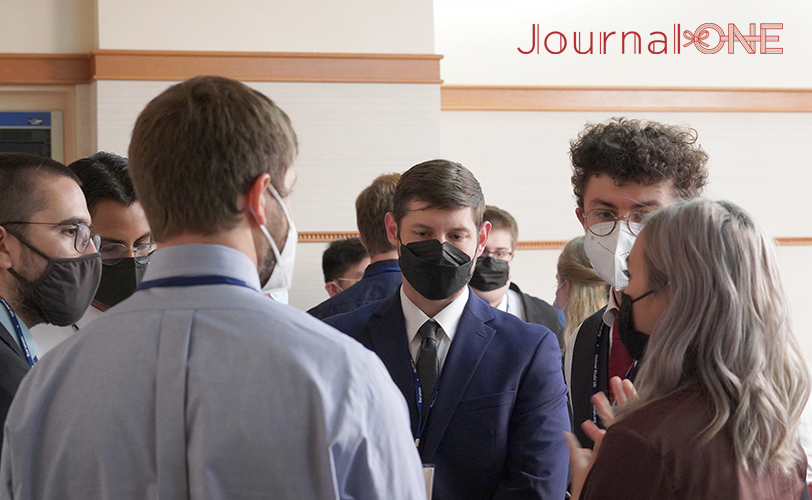
Required preparation seems hard even if they were in Japanese, but the meetings are all in English….
Therefore, a high level of English proficiency is also required to make the most of what they have prepared. Kobe City University of Foreign Studies actively participates in NMUN in order to foster this high-level language ability in a practical format. It is just amazing!
<Opening Ceremony>
The opening ceremony was held at Kobe Portopia Hotel, and even though attendance was limited due to the spread of COVID-19 the lineup of attendees was magnificent! The content of the conference was also very moving.
All delegates looked very nervous before the opening ceremony, which was about to begin. Seven students from California State University, San Bernardino, who I closely interviewed yesterday during the cultural visiting of Kyoto, were also looking nervous.
Angeli Richards, who will represent India and Jamaica at the UN General Assembly session, said, “I am very nervous for the meeting. I’ve done all the preparation I could until last night, but I still can’t calm down.” Unlike the way she talked to us yesterday eating gmacha ice cream, we could sense her nervousness through her smile.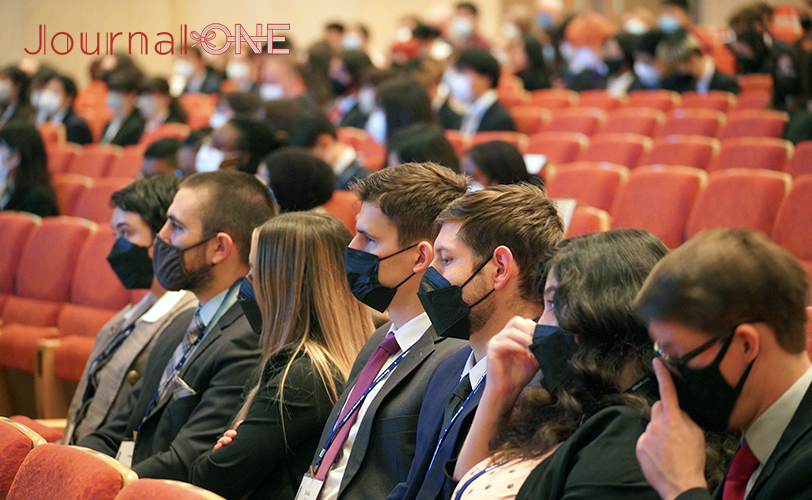
Perhaps anticipating such an atmosphere, the opening ceremony began with a performance to ease the tension of the delegates. It was an iaido performance!
Performers dressed in kimonos emerged from the darkness. To pop music played on traditional Japanese instruments, iaido sword fights and creative dances in vivid furisode (long-sleeved kimono) enlivened the venue. After the performance, there was big applause, cheers, and finger whistles, and all delegates looked excited. At the end of the performance, the tension seemed to have dissipated.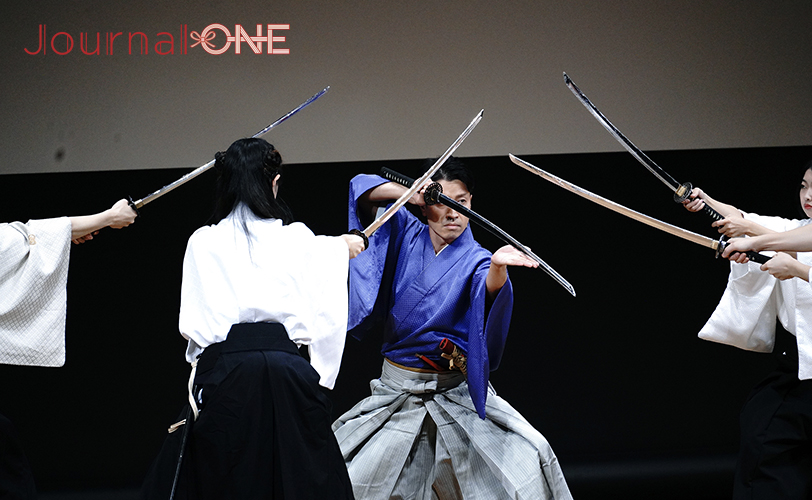
UN Secretary-General Antonio Guterres speaks in a video message. As who is working daily to overcome a variety of challenges, including deepening poverty and growing inequality, inequitable distribution of COVID-19 vaccine, inadequate climate commitments, ongoing conflicts and divisions, and misinformation, he said, “The youth’s initiative is the hope of the United Nations.”
Professor Plotzik of Ukrainian Catholic University, who attended the conference from Ukraine, a country attracting worldwide attention, spoke about the current situation in Ukraine and how much has been sacrificed there. “It is extremely important that this conference will be an opportunity to rethink “peace” with the young people who will build the future,” he said.
After Professor Ploczik’s speech, all the delegates responded to his message with a heartwarming standing ovation.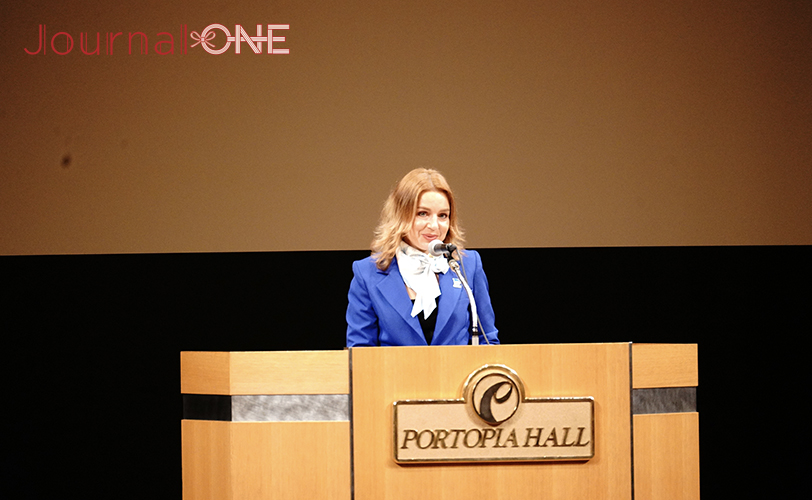
President Satoru Tanaka of Kobe City University of Foreign Studies, who represented the organizers, also expressed his deep emotion. “I feel very honored to be able to host this conference in Kobe, and after two years of postponement, I am deeply moved that this is the first face-to-face meeting outside the United States since the spread of COVID-19.” He paid tribute to the students at Kobe City University of Foreign Studies, who overcame many hardships to host the event, and to all the delegates from all the countries gathered here. It was a wonderful message that united the hearts of the audience.
After the closing session, Alexander Edsel, who will represent Jamaica at the Convention on the Non-Proliferation of Nuclear Weapons Review Conference, said, “The ceremony was very moving and memorable. As for the upcoming sessions, I will do my best to express well what we have spent so much time preparing for.”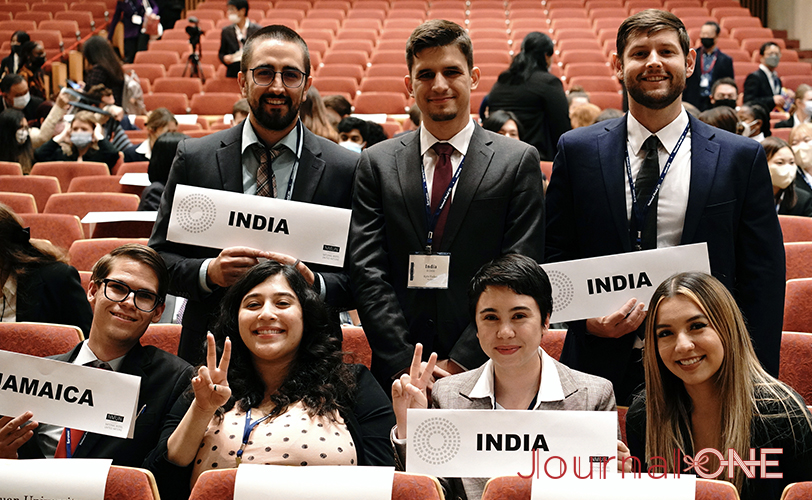
<The delegates in the session >
This year’s NMUN will be divided into four sessions: the UN General Assembly, the Security Council, the Economic and Social Council, and the Review Conference on the Non-Proliferation of Nuclear Weapons, each of which will discuss one of two issues set out in advance.
On the first day, which began in the afternoon, everyone was nervous as they were divided into their respective chambers with their computers and materials in hand. The meeting proceeded under the leadership of the chairperson the assistant chair, and time passed quietly at first in all chambers as slides were shown and delegates from each country expressed their opinions.
Then, after a short break, the excitement in the halls rose high! Because the informal sessions had begun, in which people could freely negotiate and discuss with other countries.
Delegates from each country look for countries with similar opinions to cooperate and form groups. The groups will work together to write a draft resolution on the agenda, but it seems that the first step is to find a group to work with. The delegates from each country were changing places, and the venue and even the lobby outside the conference room were filled with people, some sitting around tables, some in a circle of chairs, and some sitting in a circle on the ground!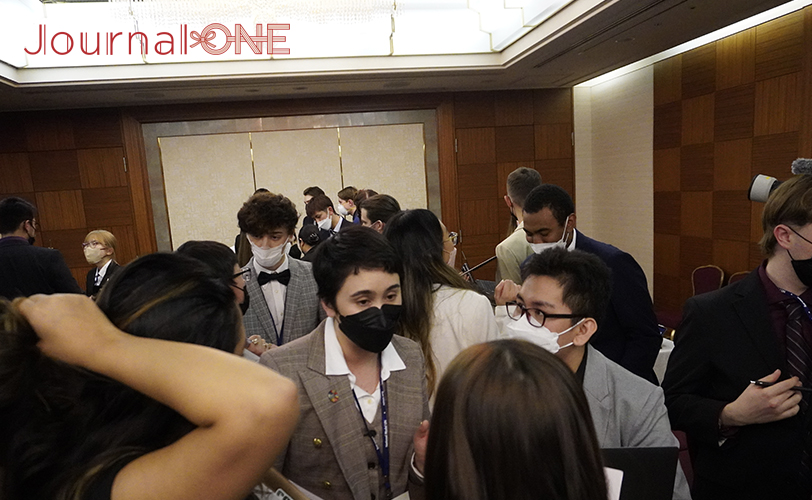
<High school students with sparkling eyes observing the conference.>
The conference also offers tours for high school students interested in NMUN to observe the meeting. High school students and their teachers tour the floor of the House in groups of 10 or more.
We were able to speak with two high school students who were watching the conference with serious eyes. They are Sakura Funabiki, a second-year international humanities student at Rokko Island High School in Kobe, and Kanon Yamanaka, a first-year humanities student at Rokko Island High School.
Rokko Island High School is a high school that has been in operation for 25 years this year. In the first year, all students study the same subjects and courses, but in the second year, students can choose courses up to their desired career path.
The International Humanities and Humanities and Social Sciences courses are designed to deepen students’ interest in Japanese and foreign languages and cultures, and to nurture individuals who can communicate Japanese culture to the international community.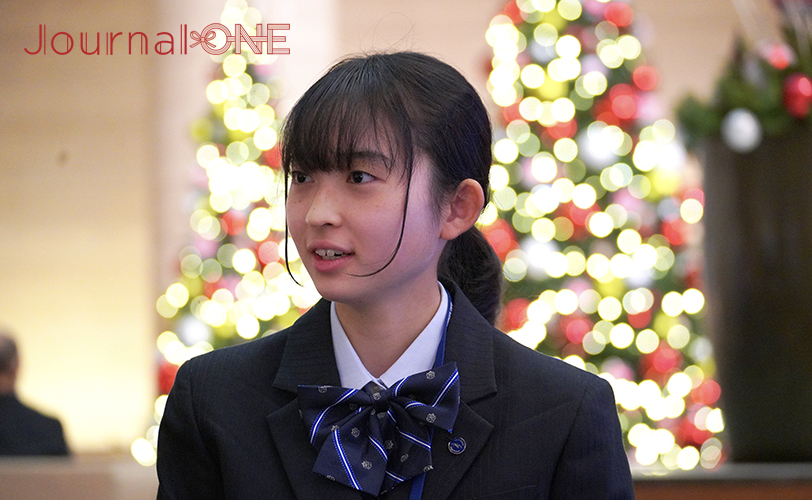
Sakura, who belongs to ESS and has been putting effort into studying English in order to read most of the materials written in English. She is interested the history of Turkey during the Ottoman Empire. “I was surprised at the atmosphere in the hall where I could only hear English.” She said, “I was very impressed by the way the students of Kobe City University of Foreign Studies were able to debate in English so openly in such an environment.”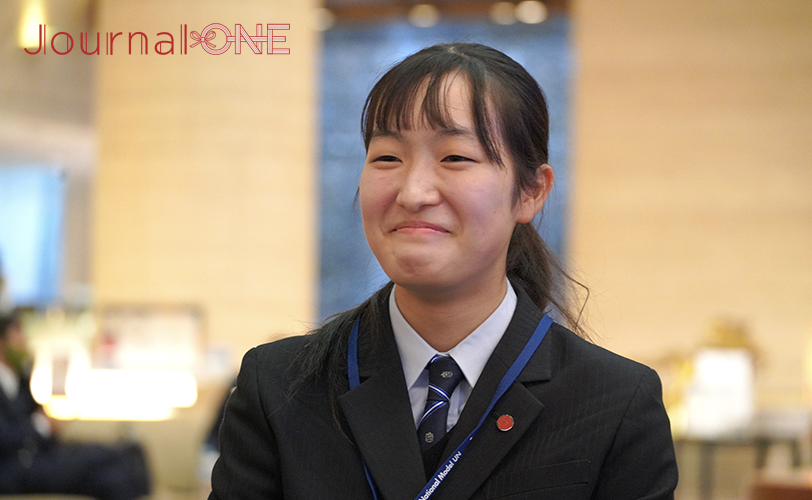
Kanon has been studying English since childhood and dreams of guiding her mother around the heritages of her favorite Central and South American countries. “The English I usually speak in high school classes is not good enough for me at all. It made me realize I needed to study more.” She spoke like she was imagining herself participating in a conference in a few years’ time.
Both of them hope to enter Kobe City University of Foreign Studies. Their decision was further strengthened by seeing the success of their seniors. The smiles on the faces of these two wonderful future leaders were very impressive.
<University students are also in charge of the conference>
Even as the sessions were beginning to get busier, Ms. Hikita Keisha Lorraine Santoyo, Secretary General of the NMUN Kobe Conference, agreed to an exclusive interview.
During the morning panel discussion, Ms. Hikita participated in the convention’s original T-shirt donation ceremony with Mr. Koji Yanai, Senior Executive Officer of Fast Retailing Group, which operates UNIQLO, and gave a magnificent speech in front of a large audience at the opening ceremony.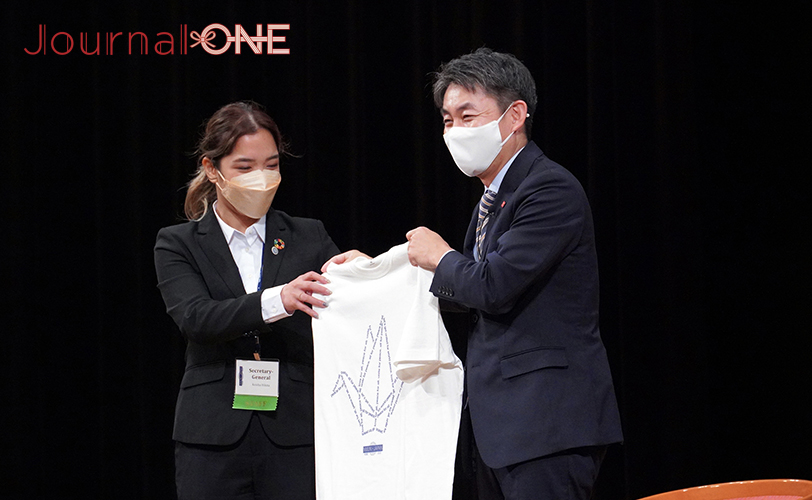
We asked her if it was all right to interview her at such a busy time…
“My main role is to oversee all the students involved in the Model United Nations at Kobe City University of Foreign Studies, so it’s like my job is almost done!” says Ms. Hikita cheerfully.
In organizing NMUN, Kobe City University of Foreign Studies has established committees for various roles, such as assisting with sessions, planning cultural visiting itineraries, and organizing tours for high school students. My main job is to bring those committees together, so it’s a lot of work before the meeting even starts.” She explained the difficulty of organizing the participating students.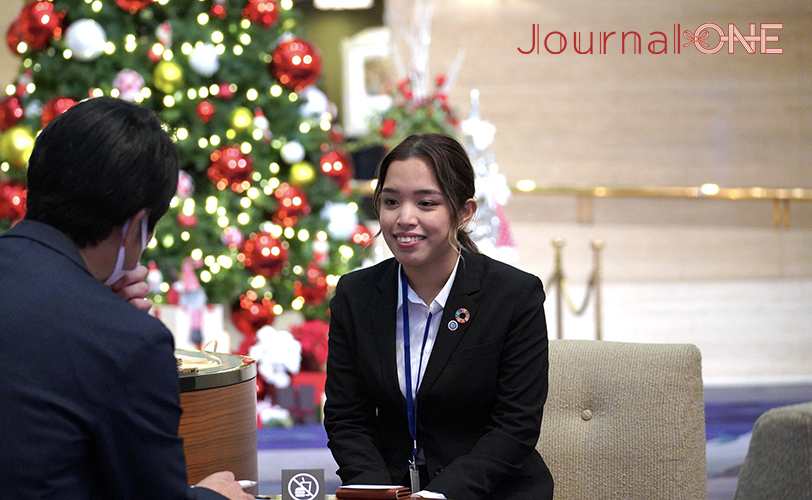
“When I was a sophomore, the decision was made to postpone NMUN due to COVID-19. The seniors who had been involved in organizing the event had graduated, so we were no longer able to create the event by ourselves. So we, the younger students who had worked together on the preparations up to that point, were asked to take over and lead the event. I am very honored to serve as Secretary General and to be a member of the committee,” she said, recalling two years ago, when she carried the thoughts of her seniors.
“I also learned the importance of understanding the other country’s point of view and dealing with them through education,” she said, adding that she felt fulfilled after completing NMUN’s activities.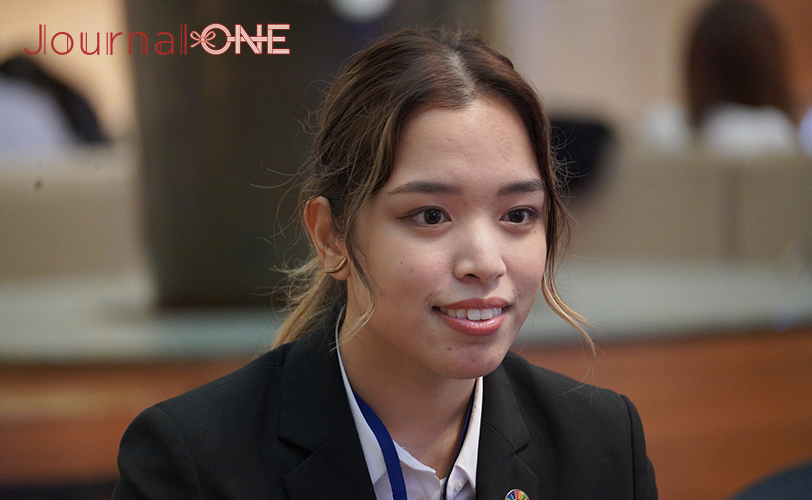
After graduation, Ms. Hikita plans to work for an IT company.
I would like to be involved in UN activities. The cooperation of the private sector (private companies, etc.) is essential for UN activities. As you can see from our recent activities with UNIQLO, I believe that cooperation between UN agencies and the private sector is important in mobilizing public opinion. By working for a private company that is capable of such activities, I hope to one day be involved in UN activities. The sparkle in Ms. Hikita’s eyes as she spoke of the future in a firm tone of voice reminded us once again why NMUN is so highly regarded around the world.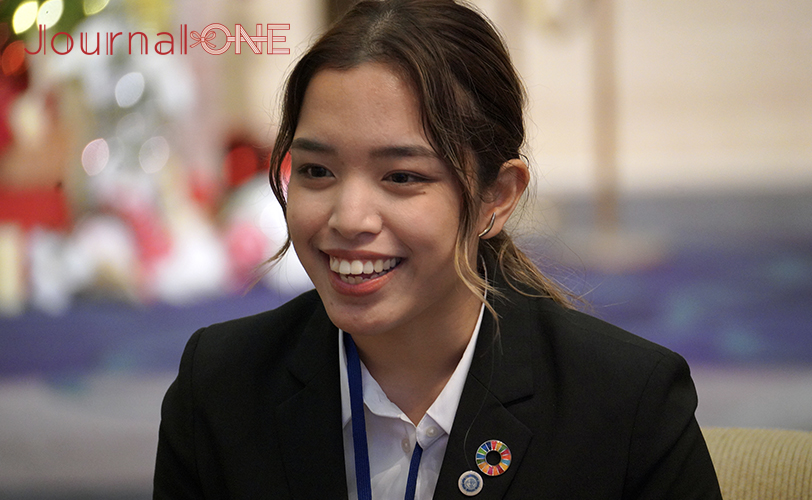
Shortly after our interview with Ms. Hikita, the first day’s session seemed to have ended without any incident.
Kyle Foiles, who represented India at the Economic and Social Council session, and Guadalupe Miranda and Angeli Richards, who participated in the UN General Assembly session, came out of the conference hall with satisfied faces.
Without needing to ask, they all look satisfied as they reflect on their productive day and their impressions of the session. Kyle said, “My partner couldn’t make it, so I had to attend the session by myself, but I was able to conduct the meeting based on the materials we prepared together beforehand.”, “The first day’s session only started in the afternoon, but tomorrow’s session will start in the morning, so I have to get relaxed and prepare for tomorrow’s session.” Angelie was also excited.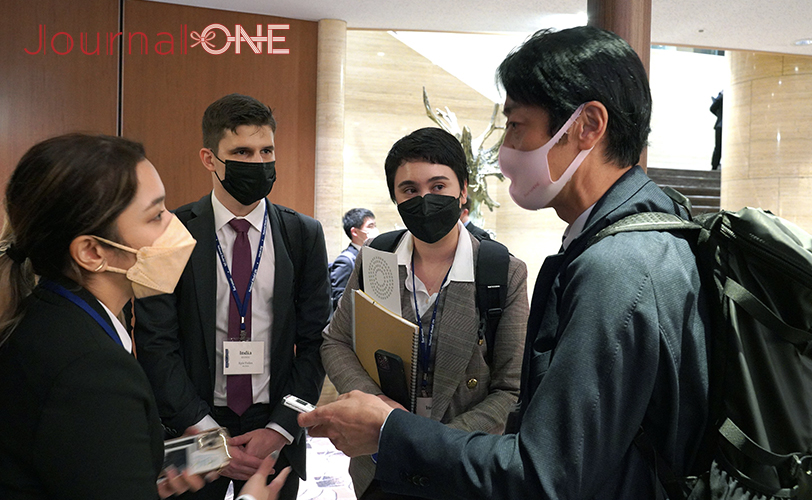
A photo with Secretary General Ms. Hikita, who even interpreted for us.
The smiles on the faces of the participants, who had nervously fulfilled their important roles, were a scene that made us believe in the success of the NMUN Kobe Conference and a bright future of peace.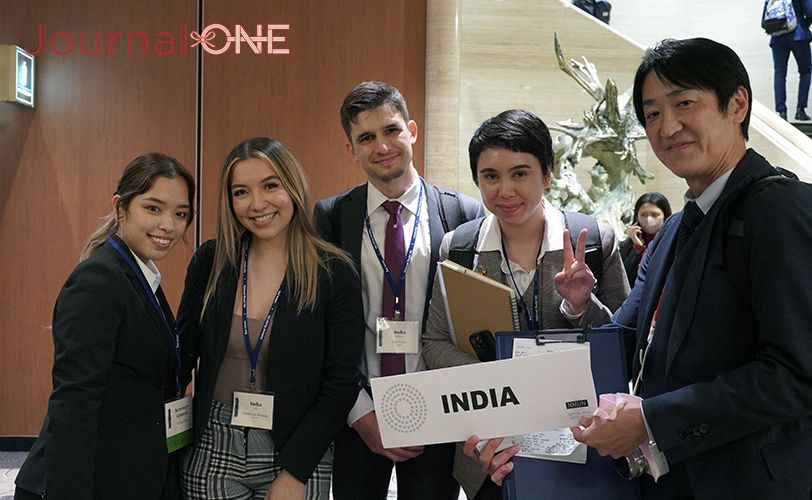
The report of “Kyoto Cultural Visiting,” which the participants from California State University, San Bernardino participated in the day before the conference, is available here.
Please check it out the report by Ms. Azuki Suzuki of Kobe City University of Foreign Studies on her exchange with 7 students from California State University, San Bernardino.







